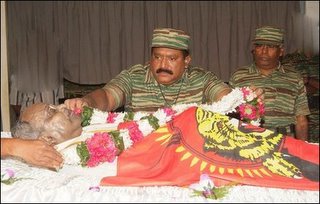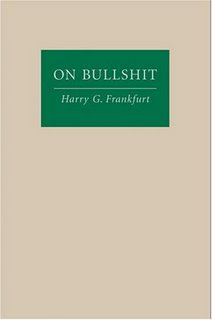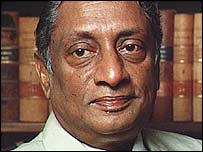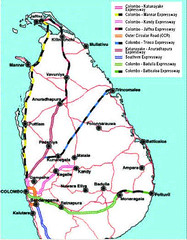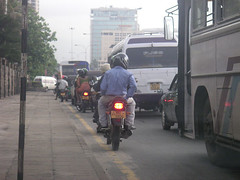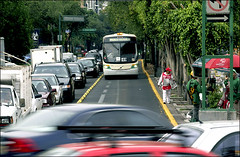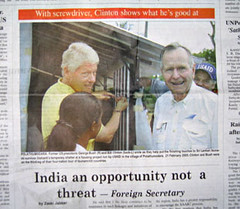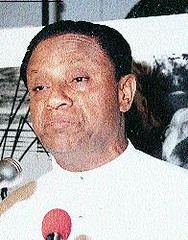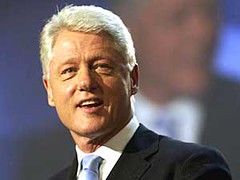In 2003 I read a great article in NYT by STEPHEN J. DUBNER on Steven D. Levitt.
stephenjdubner.comJust in case it vanishes from the web I'm linking the article in several other places.
lair.xent.comphoenix.liu.eduI'm posting the article below and will be explaining later how this is tied to the English education in Sri Lanka
--------------------------------------------------------
August 3, 2003
The Probability That a Real-Estate Agent Is Cheating You (and Other Riddles of Modern Life)By STEPHEN J. DUBNER
he most brilliant young economist in America -- the one so deemed, at least, by a jury of his elders -- brakes to a stop at a traffic light on Chicago's south side. It is a sunny day in mid-June. He drives an aging green Chevy Cavalier with a dusty dashboard and a window that doesn't quite shut, producing a dull roar at highway speeds.
But the car is quiet for now, as are the noontime streets: gas stations, boundless concrete, brick buildings with plywood windows.
An elderly homeless man approaches. It says he is homeless right on his sign, which also asks for money. He wears a torn jacket, too heavy for the warm day, and a grimy red baseball cap.
The economist doesn't lock his doors or inch the car forward. Nor does he go scrounging for spare change. He just watches, as if through one-way glass. After a while, the homeless man moves along.
''He had nice headphones,'' says the economist, still watching in the rearview mirror. ''Well, nicer than the ones I have. Otherwise, it doesn't look like he has many assets.''
Steven Levitt tends to see things differently than the average person. Differently, too, than the average economist. This is either a wonderful trait or a troubling one, depending on how you feel about economists. The average economist is known to wax oracularly about any and all monetary issues. But if you were to ask Levitt his opinion of some standard economic matter, he would probably swipe the hair from his eyes and plead ignorance. ''I gave up a long time ago pretending that I knew stuff I didn't know,'' he says. ''I mean, I just -- I just don't know very much about the field of economics. I'm not good at math, I don't know a lot of econometrics, and I also don't know how to do theory. If you ask me about whether the stock market's going to go up or down, if you ask me whether the economy's going to grow or shrink, if you ask me whether deflation's good or bad, if you ask me about taxes -- I mean, it would be total fakery if I said I knew anything about any of those things.''
In Levitt's view, economics is a science with excellent tools for gaining answers but a serious shortage of interesting questions. His particular gift is the ability to ask such questions. For instance: If drug dealers make so much money, why do they still live with their mothers? Which is more dangerous, a gun or a swimming pool? What really caused crime rates to plunge during the past decade? Do real-estate agents have their clients' best interests at heart? Why do black parents give their children names that may hurt their career prospects? Do schoolteachers cheat to meet high-stakes testing standards? Is sumo wrestling corrupt?
And how does a homeless man afford $50 headphones?
Many people -- including a fair number of his peers -- might not recognize Levitt's work as economics at all. But he has merely distilled the so-called dismal science down to its most primal aim: explaining how people get what they want, or need. Unlike most academics, he is unafraid of using personal observations and curiosities (though he does fear calculus). He is an intuitionist. He sifts through a pile of data to find a story that no one else had found. He devises a way to measure an effect that veteran economists had declared unmeasurable. His abiding interests -- though he says he has never trafficked in them himself -- are cheating, corruption and crime.
His interest in the homeless man's headphones, meanwhile, didn't last long. ''Maybe,'' he said later, ''it was just testimony to the fact I'm too disorganized to buy a set of headphones that I myself covet.''
Levitt is the first to say that some of his topics border on the trivial. But he has proved to be such an ingenious researcher and clear-eyed thinker that instead of being consigned to the fringe of his field, the opposite has happened: he has shown other economists just how well their tools can make sense of the real world.
''Levitt is considered a demigod, one of the most creative people in economics and maybe in all social science,'' says Colin Camerer, an economist at the California Institute of Technology. ''He represents something that everyone thinks they will be when they go to grad school in econ, but usually they have the creative spark bored out of them by endless math -- namely, a kind of intellectual detective trying to figure stuff out.''
Levitt is a populist in a field that is undergoing a bout of popularization. Undergraduates are swarming the economics departments of elite universities. Economics is seen as the ideal blend of intellectual prestige (it does offer a Nobel, after all) and practical training for a high-flying finance career (unless, like Levitt, you choose to stay in academia). At the same time, economics is ever more visible in the real world, thanks to the continuing fetishization of the stock market and the continuing fixation with Alan Greenspan.
The greatest change, however, is within the scholarly ranks. Microeconomists are gaining on the macro crowd, empiricists gaining on the theorists. Behavioral economists have called into doubt the very notion of ''homo economicus,'' the supposedly rational decision-maker in each of us. Young economists of every stripe are more inclined to work on real-world subjects and dip into bordering disciplines -- psychology, criminology, sociology, even neurology -- with the intent of rescuing their science from its slavish dependence upon mathematical models.
Levitt fits everywhere and nowhere. He is a noetic butterfly that no one has pinned down -- he was once offered a job on the Clinton economic team, and the Bush campaign approached him about being a crime adviser -- but who is widely appreciated.
''Steve isn't really a behavioral economist, but they'd be happy to have him,'' says Austan Goolsbee, who teaches economics at the University of Chicago's Graduate School of Business. ''He's not really an old price-theory guy, but these Chicago guys are happy to claim him. He's not really a Cambridge guy'' -- although Levitt went to Harvard and then M.I.T. -- ''but they'd love him to come back.''
He has critics, to be sure. Daniel Hamermesh, a prominent labor economist at the University of Texas, has taught Levitt's paper ''The Impact of Legalized Abortion on Crime'' to his undergraduates. ''I've gone over this paper in draft, in its printed version, at great length, and for the life of me I can't see anything wrong with it,'' Hamermesh says. ''On the other hand, I don't believe a word of it. And his stuff on sumo wrestlers -- well, this is not exactly fundamental, unless you're Japanese and weigh 500 pounds.''
But at 36, Levitt is a full professor in the University of Chicago's economics department, the most legendary program in the country. (He received tenure after only two years.) He is an editor of The Journal of Political Economy, a leading journal in the field. And the American Economic Association recently awarded him its John Bates Clark Medal, given biennially to the country's best economist under 40.
He is a prolific and diverse writer. But his paper linking a rise in abortion to a drop in crime has made more noise than the rest combined. Levitt and his co-author, John Donohue of Stanford Law School, argued that as much as 50 percent of the huge drop in crime since the early 1990's can be traced to Roe v. Wade. Their thinking goes like this: the women most likely to seek an abortion -- poor, single, black or teenage mothers -- were the very women whose children, if born, have been shown most likely to become criminals. But since those children weren't born, crime began to decrease during the years they would have entered their criminal prime. In conversation, Levitt reduces the theory to a tidy syllogism: ''Unwantedness leads to high crime; abortion leads to less unwantedness; abortion leads to less crime.''
Levitt had already published widely about crime and punishment. One paper he wrote as a graduate student is still regularly cited. His question was disarmingly simple: Do more police translate into less crime? The answer would seem obvious -- yes -- but had never been proved: since the number of police officers tends to rise along with the number of crimes, the effectiveness of the police was tricky to measure.
Levitt needed a mechanism that would unlink the crime rate from police hiring. He found it within politics. He noticed that mayors and governors running for re-election often hire more police officers. By measuring those police increases against crime rates, he was able to determine that additional officers do indeed bring down violent crime.
That paper was later disputed -- another graduate student found a serious mathematical mistake in it -- but Levitt's ingenuity was obvious. He began to be acknowledged as a master of the simple, clever solution. He was the guy who, in the slapstick scene, sees all the engineers futzing with a broken machine -- and then realizes that no one has thought to plug it in.
Arguing that the police help deter crime didn't make Levitt any enemies. Arguing that abortion deterred crime was another matter.
In the abortion paper, published in 2001, he and Donohue warned that their findings should not be seen ''as either an endorsement of abortion or a call for intervention by the state in the fertility decisions of women.'' They suggested that crime might just as easily be curbed by ''providing better environments for those children at greatest risk for future crime.''
Still, the very topic managed to offend nearly everyone. Conservatives were enraged that abortion could be construed as a crime-fighting tool. Liberals were aghast that poor and black women were singled out. Economists grumbled that Levitt's methodology was not sound. A syllogism, after all, can be a magic trick: All cats die; Socrates died; therefore Socrates was a cat.
''I think he's enormously clever in so many areas, focusing very much on the issue of reverse causality,'' says Ted Joyce, an economist at Baruch College who has written a critical response to the abortion paper. ''But in this case I think he ignored it, or didn't tend to it well enough.''
As the news media gorged on the abortion-crime story, Levitt came under direct assault. He was called an ideologue (by conservatives and liberals alike), a eugenicist, a racist and downright evil.
In reality, he seems to be very much none of those. He has little taste for politics and less for moralizing. He is genial, low-key and unflappable, confident but not cocky. He is a respected teacher and colleague; he is a sought-after collaborator who, because of the breadth of his curiosities, often works with scholars outside his field -- another rarity for an economist.
''I hesitate to use these words, but Steve is a con man, in the best sense,'' says Sudhir Venkatesh, a sociologist at Columbia University. ''He's the Shakespearean jester. He'll make you believe his ideas were yours.'' Venkatesh was Levitt's co-author on ''An Economic Analysis of a Drug-Selling Gang's Finances,'' which found that the average street dealer lives with his mother because the take-home pay is, frankly, terrible. The paper analyzed one crack gang's financial activities as if it were any corporation. (It was Venkatesh who procured the data, from a former gang member.) Such a thing had never been tried. ''This lack of focus,'' Levitt deadpanned in one version of the paper, ''is perhaps partly attributable to the fact that few economists have been involved in the study of gangs.''
Levitt speaks with a boyish lisp. His appearance is High Nerd: a plaid button-down shirt, nondescript khakis and a braided belt, sensible shoes. His pocket calendar is branded with the National Bureau of Economic Research logo. ''I wish he would get more than three haircuts a year,'' his wife, Jeannette, says, ''and that he wasn't still wearing the same glasses he got 15 years ago, which weren't even in fashion then.'' He was a good golfer in high school but has so physically atrophied that he calls himself ''the weakest human being alive'' and asks Jeannette to open jars around the house.
There is nothing in his appearance or manner, in other words, that suggests a flamethrower. He will tell you that all he does is sit at his desk, day and night, wrestling with some strange mountain of data. He will tell you that he would do it free (his salary is reportedly more than $200,000), and you tend to believe him. He may be an accidental provocateur, but he is a provocateur nonetheless.
He takes particular delight in catching wrongdoers. In one paper, he devised a set of algorithms that could identify teachers in the Chicago public-school system who were cheating. ''Cheating classrooms will systematically differ from other classrooms along a number of dimensions,'' he and his co-author, Brian Jacob of the Kennedy School of Government, wrote in ''Catching Cheating Teachers.'' ''For instance, students in cheating classrooms are likely to experience unusually large test-score gains in the year of the cheating, followed by unusually small gains or even declines in the following year when the boost attributable to cheating disappears.''
Levitt used test-score data from the Chicago schools that had long been available to other researchers. There were a number of ways, he realized, that a teacher could cheat. If she were particularly brazen (and stupid), she might give students the correct answers. Or, after the test, she might actually erase students' wrong answers and fill in correct ones. A sophisticated cheater would be careful to avoid conspicuous blocks of identical answers. But Levitt was more sophisticated. ''The first step in analyzing suspicious strings is to estimate the probability each child would give a particular answer on each question,'' he wrote. ''This estimation is done using a multinomial logit framework with past test scores, demographics and socioeconomic characteristics as explanatory variables.''
So by measuring any number of factors -- the difficulty of a particular question, the frequency with which students got hard questions right and easy ones wrong, the degree to which certain answers were highly correlated in one classroom -- Levitt identified which teachers he thought were cheating. (Perhaps just as valuable, he was also able to identify the good teachers.) The Chicago school system, rather than disputing Levitt's findings, invited him into the schools for retesting. As a result, the cheaters were fired.
Then there is his coming ''Understanding Why Crime Fell in the 1990's: Four Factors That Explain the Decline and Seven That Do Not.'' The entire drop in crime, Levitt says, was due to more police officers, more prisoners, the waning crack epidemic and Roe v. Wade.
One factor that probably didn't make a difference, he argues, was the innovative policing strategy trumpeted in New York by Rudolph Giuliani and William Bratton.
''I think,'' Levitt says, ''I'm pretty much alone in saying that.''
e comes from a Minneapolis family of high, if unusual, achievers. His father, a medical researcher, is considered a leading authority on intestinal gas. (He bills himself as ''The Man Who Gave Status to Flatus and Class to Gas.'') One of Levitt's great uncles, Robert May, wrote ''Rudolph the Red-Nosed Reindeer'' -- the book, that is; another great uncle, Johnny Marks, later wrote the song.
At Harvard, Levitt wrote his senior thesis on thoroughbred breeding and graduated summa cum laude. (He is still obsessed with horse racing. He says he believes it is corrupt and has designed a betting system -- the details of which he will not share -- to take advantage of the corruption.) He worked for two years as a management consultant before enrolling at M.I.T. for a doctorate in economics. The M.I.T. program was famous for its mathematical intensity. Levitt had taken exactly one math course as an undergraduate and had forgotten even that. During his first graduate class, he asked the student next to him about a formula on the board: Is there any difference between the derivative sign that's straight up-and-down and the curly one? ''You are in so much trouble,'' he was told.
''People wrote him off,'' recalls Austan Goolsbee, the Chicago economist who was then a classmate. ''They'd say, 'That guy has no future.'''
Levitt set his own course. Other grad students stayed up all night working on problem sets, trying to make good grades. He stayed up researching and writing. ''My view was that the way you succeed in this profession is you write great papers,'' he says. ''So I just started.''
Sometimes he would begin with a question. Sometimes it was a set of data that caught his eye. He spent one entire summer typing into his computer the results of years' worth of Congressional elections. (Today, with so much information so easily available on the Internet, Levitt complains that he can't get his students to input data at all.) All he had was a vague curiosity about why incumbents were so often re-elected.
Then he happened upon a political-science book whose authors claimed that money wins elections, period. ''They were trying to explain election outcomes as a function of campaign expenditures,'' he recalls, ''completely ignoring the fact that contributors will only give money to challengers when they have a realistic chance of winning, and incumbents only spend a lot when they have a chance of losing. They convinced themselves this was the causal story even though it's so obvious in retrospect that it's a spurious effect.''
Obvious, at least, to Levitt. Within five minutes, he had a vision of the paper he would write. ''It came to me,'' he says, ''in full bloom.''
The problem was that his data couldn't tell him who was a good candidate and who wasn't. It was therefore impossible to tease out the effect of the money. As with the police/crime rate puzzle, he had to trick the data.
Because he himself had typed in the data, he had noticed something: often, the same two candidates faced each other multiple times. By analyzing the data from only those elections, Levitt was able to find a true result. His conclusion: campaign money has about one-tenth the impact as was commonly accepted.
An unknown graduate student, he sent his paper to The Journal of Political Economy -- one professor told him he was crazy for even trying -- where it was published. He completed his Ph.D. in three years, but because of his priorities, he says, he was ''invisible'' to the faculty, ''a real zero.'' Then he stumbled upon what he now calls the turning point in his career.
He had an interview for the Society of Fellows, the venerable intellectual Harvard clubhouse that pays young scholars to do their own work, for three years, with no commitments. Levitt felt he didn't stand a chance. For starters, he didn't consider himself an intellectual. He would be interviewed over dinner by the senior fellows, a collection of world-renowned philosophers, scientists and historians. He worried he wouldn't have enough conversation for even the first course.
Instead, he was on fire. Whatever subject came up -- the brain, ants, philosophy -- he just happened to remember something pithy he'd read. His wit crackled as it had never crackled before. When he told them about the two summers he spent betting the horses back in Minnesota, they ate it up!
Finally -- disquietingly -- one of them said: ''I'm having a hard time seeing the unifying theme of your work. Could you explain it?''
Levitt was stymied. He had no idea what his unifying theme was, or if he even had one.
Amartya Sen, the future Nobel-winning economist, jumped in and neatly summarized what he saw as Levitt's theme.
Yes, Levitt said eagerly, that's my theme.
Another fellow then offered another theme.
You're right, Levitt said, that's my theme.
And so it went, like dogs tugging at a bone, until the philosopher Robert Nozick interrupted. If Levitt could have been said to have an intellectual hero, it would be Nozick.
''How old are you, Steve?'' he asked.
''Twenty-six.''
Nozick turned to the other fellows: ''He's 26 years old. Why does he need to have a unifying theme? Maybe he's going to be one of those people who's so talented he doesn't need one. He'll take a question and he'll just answer it, and it'll be fine.''
he University of Chicago's economics department had a famous unifying theme -- the Gospel of Free Markets, with a conservative twist -- and would therefore not have seemed the most likely fit for Levitt. As he sees it, Chicago is about theory, deep thinking and big ideas, while he is about empiricism, clever thinking and ''cute but ultimately insubstantial ideas.''
But Chicago also had Gary Becker. To Levitt, Becker is the most influential economist of the past 50 years. Long before it was fashionable, Becker brought microeconomic theory to offbeat topics, the family and crime in particular. For years, Becker was demonized -- a single phrase like ''the price of children'' would set off untold alarms. ''I took a lot of heat over my career from people who thought my work was silly or irrelevant or not economics,'' Becker says. But Chicago supported him; he persevered, winning the Nobel Prize in 1992; and he became Steven Levitt's role model.
Becker told Levitt that Chicago would be a great environment for him. ''Not everybody agrees with all your results,'' he said, ''but we agree what you're doing is very interesting work, and we'll support you in that.''
Levitt soon found that the support at Chicago went beyond the scholarly. The year after he was hired, his wife gave birth to their first child, Andrew. One day, just after Andrew turned a year old, he came down with a slight fever. The doctor diagnosed an ear infection. When he started vomiting the next morning, his parents took him to the hospital. A few days later he was dead of pneumococcal meningitis.
Amid the shock and grief, Levitt had an undergraduate class that needed teaching. It was Gary Becker -- a Nobel laureate nearing his 70th birthday -- who sat in for him. Another colleague, D. Gale Johnson, sent a condolence card that Levitt still quotes from memory.
Levitt and Johnson, an agricultural economist in his 80's, began speaking regularly. Levitt learned that Johnson's daughter was one of the first Americans to adopt a daughter from China. Soon the Levitts adopted a daughter of their own, whom they named Amanda. In addition to Amanda, they have since had a daughter, now almost 3, and a son. But Andrew's death has played on, in various ways. They have become close friends with the family of the little girl to whom they donated Andrew's liver. (They also donated his heart, but that baby died.) And not surprisingly for a scholar who pursues real-life subjects, the death also informed Levitt's work.
He and Jeannette joined a support group for grieving parents. Levitt was struck by how many children had drowned in swimming pools. They were the kinds of deaths that don't make the newspaper -- unlike, for instance, a child who dies while playing with a gun.
Levitt was curious and went looking for numbers that would tell the story. He wrote up the results as an op-ed article for The Chicago Sun-Times. It featured the sort of plangent counterintuition for which he has become famous: ''If you own a gun and have a swimming pool in the yard, the swimming pool is almost 100 times more likely to kill a child than the gun is.''
Trying to get his mind off death, Levitt took up a hobby: rehabbing and selling old houses in Oak Park, where he lives. This experience has led to yet another paper, about the real-estate market. It is his most Chicago-style paper yet, a romp in price theory, a sign that the university's influence on him is perhaps as strong as his influence on it. But Levitt being Levitt, it also deals with corruption.
While negotiating to buy old houses, he found that the seller's agent often encouraged him, albeit cagily, to underbid. This seemed odd: didn't the agent represent the seller's best interest? Then he thought more about the agent's role. Like many other ''experts'' (auto mechanics and stockbrokers come to mind), a real-estate agent is thought to know his field far better than a lay person. A homeowner is encouraged to trust the agent's information. So if the agent brings in a low offer and says it might just be the best the homeowner can expect, the homeowner tends to believe him. But the key, Levitt determined, lay in the fact that agents ''receive only a small share of the incremental profit when a house sells for a higher value.'' Like a stockbroker churning commissions or a bookie grabbing his vig, an agent was simply looking to make a deal, any deal. So he would push homeowners to sell too fast and too cheap.
Now if Levitt could only measure this effect. Once again, he found a clever mechanism. Using data from more than 50,000 home sales in Cook County, Ill., he compared the figures for homes owned by real-estate agents with those for homes for which they acted only as agents. The agents' homes stayed on the market about 10 days longer and sold for 2 percent more.
Late on a summer afternoon, Levitt is in his office, deep inside one of the university's Gothic behemoths. The ceiling is stained, the plaster around the window crumbling. He is just back from sabbatical at Stanford, and his desk is a holy mess: stacks of books and journals, a green sippy cup and a little orange squeeze hippo.
This is his afternoon to meet with students. Levitt drinks a Mountain Dew and talks softly. Some students come for research assignments, some for advice. One has just written her undergraduate thesis: ''The Labor Market Consequence of Graduating College in a Bad Economy.'' For a thesis, Levitt tells her, it's very good. But now she wants to have it published.
''You write like a college student, and that's a problem,'' he says. ''The thing is, you're telling a story. There's foreshadowing going on, all those tricks. You want the reader going down a particular path so when they get the results, they understand them and believe them. But you also want to be honest about your weaknesses. People are much less harsh on weaknesses that are clear than weaknesses that are hidden -- as they should be.''
Be honest about your weaknesses. Has there ever been a prize-winning scholar as honest about his weaknesses as Steven Levitt? He doesn't understand economics, he claims, or math. He's a little thinker in a world of big thinkers. He can't even open a jar of spaghetti sauce at home, poor guy.
Friends say that Levitt's self-deprecation is as calculated as it is genuine. Within academia, economists take pride in being the most cutthroat of a cutthroat breed. Anyone who writes papers on ''Weakest Link'' (contestants discriminate against Latino and elderly peers, Levitt concluded, but not blacks or women) and sumo (to best manage their tournament rankings, wrestlers often conspire to throw matches) had better not also be arrogant.
Or maybe it is not self-deprecation at all. Maybe it is self-flagellation. Maybe what Steven Levitt really wants is to graduate from his ''silly'' and ''trivial'' and ''shallow'' topics.
He thinks he's onto something with a new paper about black names. He wanted to know if someone with a distinctly black name suffers an economic penalty. His answer -- contrary to other recent research -- is no. But now he has a bigger question: Is black culture a cause of racial inequality or is it a consequence? For an economist, even for Levitt, this is new turf -- ''quantifying culture,'' he calls it. As a task, he finds it thorny, messy, perhaps impossible and deeply tantalizing.
Driving home to Oak Park that evening, his Cavalier glumly thrumming along the Eisenhower Expressway, he dutifully addresses his future. Leaving academia for a hedge fund or a government job does not interest him (though he might, on the side, start a company to catch cheating teachers). He is said to be at the top of every economics department's poaching list. But the tree he and Jeannette planted when Andrew died is getting too big to move. You get the feeling he may stay at Chicago awhile.
There are important problems, he says, that he feels ready to address.
For instance? ''Tax evasion. Money-laundering. I'd like to put together a set of tools that lets us catch terrorists. I mean, that's the goal. I don't necessarily know yet how I'd go about it. But given the right data, I have little doubt that I could figure out the answer.''
It might seem absurd for an economist to dream of catching terrorists. Just as it must have seemed absurd if you were a Chicago schoolteacher, called into an office and told that, ahem, the algorithms designed by that skinny man with thick glasses had determined that you are a cheater. And that you are being fired. Steven Levitt may not fully believe in himself, but he does believe in this: teachers and criminals and real-estate agents may lie, and politicians, and even C.I.A. analysts. But numbers don't.
Stephen J. Dubner is the author, most recently, of ''Confessions of a Hero-Worshiper.'' He is writing a book about the psychology of money.
